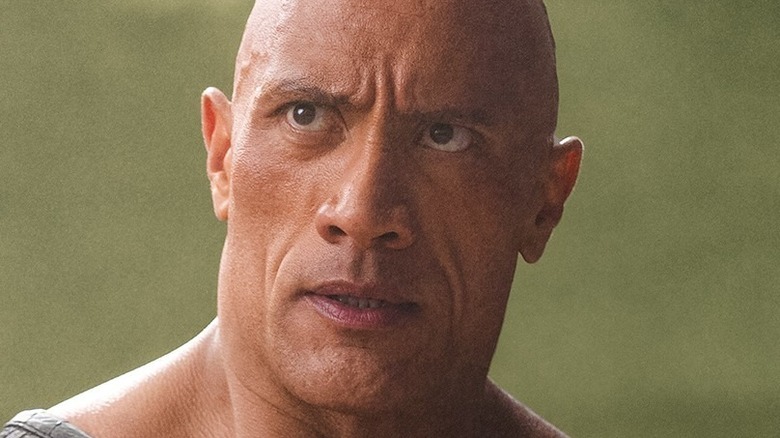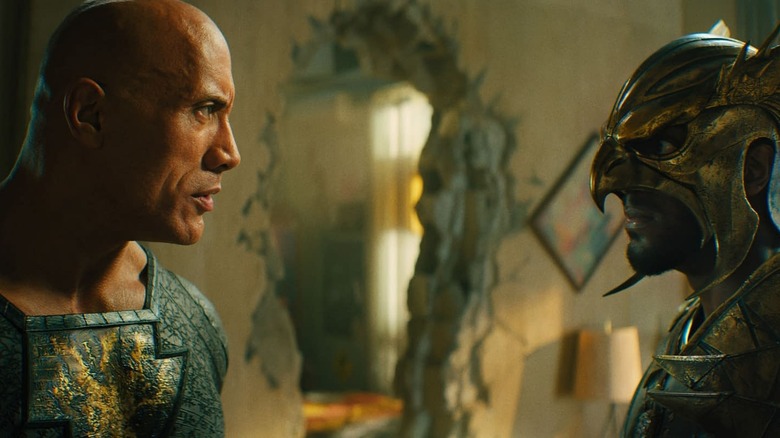Black Adam Review: The Rock's Brand Arrives To DC
- Breakneck pacing
- Thrilling, super-powered action
- Strong performances from the supporting ensemble
- Unambitious to a fault
- For better or worse, feels like it could have come out twenty years ago
It's been nearly three years since Dwayne "The Rock" Johnson took to Instagram to claim that "the hierarchy of power is about to change in the #DCUniverse." One global pandemic and some release date shifts later, his long-gestating "Black Adam" movie has finally arrived to fulfill the prophecy, but that foretold shift isn't about fictional super-powered stats anymore. The Warner Bros. Discovery merger changed the landscape significantly, but CEO David Zaslav claimed to have a 10-year plan to set things back on track. But with DC Films president Walter Hamada out, there's a massive land grab behind the scenes from various players trying to take the throne and steer the DCEU into the future. But is "Black Adam" the film to chart that new course?
Well, yes and no.
"Black Adam" is a thrilling and action-packed film that proves to be a good time, for sure. But for a number of reasons, it falls short of being a bold, fresh start for a fractured and controversy-laden cinematic universe in need of clear direction and some true narrative momentum. These days, the only films moving the needle at the box office are superhero pictures tethered to a larger fandom construct ("Spider-Man: Far From Home") or the rare, throwback actioner led by a bona fide movie star ("Top Gun: Maverick"). On paper, "Black Adam" is both.
But what the superhero picture has morphed into over the last 15 years since Johnson first developed the project feels strangely incompatible with the ego-driven process of a true movie star like Johnson. He may talk the talk of a diehard comics geek, as is customary for anyone performing in one of these productions, but Johnson is a brand before he's a fan, and "Black Adam" shows he can't serve both masters at the same time. The man who once referred to himself as "franchise viagra" for breathing new life into the "Fast & Furious" films simply by showing up in one may be too impotent for the task at hand.
What is a hero?
At a trim (for the genre) 124 minutes, "Black Adam" is paced like a runaway train hurtling to nowhere in particular. Using the loose, constantly in-flux continuity of the DCEU as a springboard, the film wastes very little time with anything that isn't getting the audience from one set piece to another, unafraid to dump huge tracts of exposition one moment, or conversely to trust its talented supporting cast to imply character depth the script just doesn't have ample room for.
The film begins with a flashback to the fictional Middle East country of Kahndaq in the year 2600 BCE, telling a story to parallel Billy Baton's origin from DC's 2019 "Shazam" adaptation. (The film, by and large, eschews direct reference to this franchise, however. More on that later.) Through voiceover narration from Amon (Bodhi Sabongui), a young Kahndaqi boy in the present day obsessed with superheroes and the freedom of his people, we learn of a slave who led a rebellion and became a God-like champion who stood up to tyranny. For 5,000 years, this country has been run by outsiders and interlopers, but insurgents like Amon's mother Adrianna (Sarah Shahi) work to find the film's MacGuffin, the Crown of Sabbac. The former ruler of Kahndaq used it to summon unimaginable power from the underworld, but in trying to hide it from Intergang, the tech-obsessed mercenaries in control of the nation, Adrianna awakens Teth-Adam (Johnson), Kahndaq's former champion.
His arrival spooks Amanda Waller (a returning Viola Davis) into recruiting the Justice Society — Hawkman (Aldis Hodge), Doctor Fate (Pierce Brosnan), Atom Smasher (Noah Centineo), and Cyclone (Quintessa Swindel) — to bring him in. From there, with very little room to breathe or process much of anything, the film bursts from Adam's beef with the Justice Society to Intergang trying to retrieve the Crown to the heroes' aims aligning to an even bigger threat than Adam coming to the fore. Given the bloat almost all modern superhero films suffer from, it's admirable that director Jaume Collet-Serra and his team of writers were able to keep this one just over the two-hour mark, but the tight runtime is both a gift and a curse.
The movie gives audiences plenty of what they probably long for the most: outrageous set pieces featuring larger-than-life characters flexing their abilities at one another. Between Adam's displays of strength, speed, and Palpatine-esque bursts of electricity, there's plenty to be awed by, and that's before seeing the Society in action. But buried within these skirmishes, "Black Adam" presents moral quandaries and anti-colonial themes that literally nobody involved with the making of this film seems particularly interested in exploring or unpacking. This is the sort of movie where characters turn directly to the screen to voice difficult questions about what it means to be a hero, what the responsibility of power calls for, and how complicated doing the right thing becomes in a world with artificially drawn borders — but then, y'know, cuts to someone being thrown through a building or having a statue hurled at them rather than engage with those ideas in the slightest.
In some ways, it's a relief to watch a superhero movie be refreshingly dumb. No one involved is name-checking old Alan J. Pakula films or pretending what they're doing is high art. The himbo approach worked wonders for James Wan's "Aquaman," and much of the DCEU has been shepherded by ex-horror filmmakers more concerned with experiential storytelling and broad myth-making than the dramas of the small characters at the center of every MCU feature. But this is a movie that feels like it could have come out 15 years ago, save for the way it relies on the proliferation of comic book adaptations to force audiences to shotgun certain narrative elements like a can of Milwaukee's Best when bygone eras would have forced them to sip on mythology and lore like a hearty Hefeweizen.
Doctor Fate's mystical, psychedelic powers don't need as much explaining in a world where the similarly gifted Doctor Strange has appeared in multiple feature films. Atom Smasher gets big like Ant-Man. Cyclone spins the wind the way Storm did in the X-Men movies. Hawkman doesn't have an obvious onscreen antecedent, but his gruff, pugnacious attitude comes off as a more reactionary version of what Batman brings to the genre. That many of these characters existed in comics long before their cinematic counterparts' origins won't prevent neophytes from referring to them as knock-offs. But that widespread familiarity is certainly a boon.
But other than the charm of watching unsung DC heroes mix it up on the big screen, what else does "Black Adam" offer?
Top Guy Booking
Before he was the world's biggest movie star, Johnson was a professional wrestler and a very successful one at that. While his performance as "Black Adam" fails to match the passion with which he defends and admires the character in the press, it's clear he's brought his sports entertainment prowess to the development of this project. His Adam is paper-thin as a character, his motivations bland, and his complexity entirely implied. He exists largely as a force of nature, and as a foil for some lazy comedy with Amon and his uncle Karim (Muhammed Amer as the film's portly comic relief), but otherwise feels more like a villain from a Rocky movie than a superhero worthy of headlining his own franchise. In the comics, Black Adam was a villain for Captain Marvel, the hero of the "Shazam" films whose name has been altered by DC for obvious branding reasons. But Billy Batson in that film is a kid, and his superhero alter-ego is goofy, affable, and unserious.
If you were booking a Wrestlemania card, Black Adam versus Shazam wouldn't sell out a stadium, much less a small arena. That's why Johnson has been so obsessed with the "hierarchy of power" within the DCEU. As his many interviews have heavily foreshadowed, he has his sights set on a bigger, potentially S-shaped target for any potential sequels this film manages to garner. But that prospect, and the main thrust of this film — of pitting heroes against one another as big fight attractions rather than investing in the characters themselves — is part of why "Batman v Superman: Dawn of Justice" failed to connect with audiences the way it could have.
Johnson is so focused on a bigger opponent on the horizon that the film's third act suffers from a flat, cobbled-together antagonist who saps the final scenes of the film of its remaining energy. This might not have been a problem if Johnson was not so risk averse as to play everything in this film as safe as humanly possible. The one major element DC has held over Marvel in recent years has been a larger willingness to experiment visually, to try different things even if some of them fail. If "Black Adam" means building out the rest of the universe in the Rock's image, it'll only become as self-serving, as short-sighted, and as carefully curated as his own personal brand. That would be a real shame for such a storied and varied universe, chock full of so many disparate and unique characters.
But only time will tell if the DCEU ever settles onto a comfortable roadmap, or if, like their publishing predecessor, they continue nuking it all and starting over every few years with a "Crisis." For now, "Black Adam" is an entertaining night out at the movies. It's just not built to do much else than pass the time.


